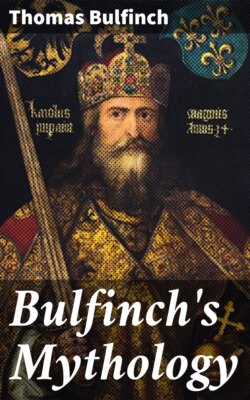Читать книгу Bulfinch's Mythology - Bulfinch Thomas - Страница 35
На сайте Литреса книга снята с продажи.
APOLLO AND HYACINTHUS
ОглавлениеApollo was passionately fond of a youth named Hyacinthus. He accompanied him in his sports, carried the nets when he went fishing, led the dogs when he went to hunt, followed him in his excursions in the mountains, and neglected for him his lyre and his arrows. One day they played a game of quoits together, and Apollo, heaving aloft the discus, with strength mingled with skill, sent it high and far. Hyacinthus watched it as it flew, and excited with the sport ran forward to seize it, eager to make his throw, when the quoit bounded from the earth and struck him in the forehead. He fainted and fell. The god, as pale as himself, raised him and tried all his art to stanch the wound and retain the flitting life, but all in vain; the hurt was past the power of medicine. As when one has broken the stem of a lily in the garden it hangs its head and turns its flowers to the earth, so the head of the dying boy, as if too heavy for his neck, fell over on his shoulder. "Thou diest, Hyacinth," so spoke Phoebus, "robbed of thy youth by me. Thine is the suffering, mine the crime. Would that I could die for thee! But since that may not be, thou shalt live with me in memory and in song. My lyre shall celebrate thee, my song shall tell thy fate, and thou shalt become a flower inscribed with my regrets." While Apollo spoke, behold the blood which had flowed on the ground and stained the herbage ceased to be blood; but a flower of hue more beautiful than the Tyrian sprang up, resembling the lily, if it were not that this is purple and that silvery white. [Footnote: It is evidently not our modern hyacinth that is here described. It is perhaps some species of iris, or perhaps of larkspur or of pansy.] And this was not enough for Phoebus; but to confer still greater honor, he marked the petals with his sorrow, and inscribed "Ah! ah!" upon them, as we see to this day. The flower bears the name of Hyacinthus, and with every returning spring revives the memory of his fate.
It was said that Zephyrus (the West wind), who was also fond of Hyacinthus and jealous of his preference of Apollo, blew the quoit out of its course to make it strike Hyacinthus. Keats alludes to this in his "Endymion," where he describes the lookers-on at the game of quoits:
"Or they might watch the quoit-pitchers, intent
On either side, pitying the sad death
Of Hyacinthus, when the cruel breath
Of Zephyr slew him; Zephyr penitent,
Who now ere Phoebus mounts the firmament,
Fondles the flower amid the sobbing rain."
An allusion to Hyacinthus will also be recognized in Milton's
"Lycidas":
"Like to that sanguine flower inscribed with woe."
